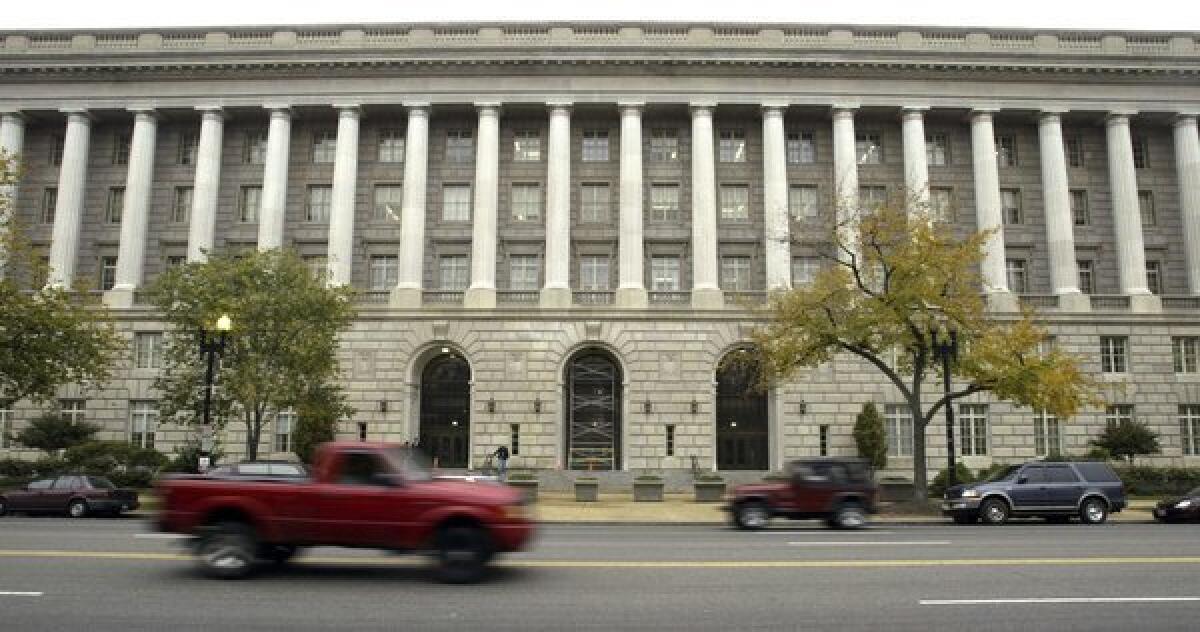Poll: The feds’ selective scrutiny of tax-exempt ‘patriots’

- Share via
Vindicating the complaints of some “tea party” activists, a top IRS official admitted Friday that the agency had singled out such groups for scrutiny in the months leading up to the 2012 election.
The revelation (accompanied by an apology from Lois Lerner, the agency’s lead overseer of tax-exempt organizations) is sure to draw an investigation in the House because it smacks of Nixonian intimidation tactics. But on the bright side for President Obama, maybe the administration has finally found a way to move Fox News off Benghazi!
At the heart of the scandal is an effort to enforce the rules that bar political campaigns from claiming tax-exempt status. A slew of recently minted nonprofit groups, known as 501(c)(4) social welfare organizations, have blurred the line between advocating policies and trying to elect (or defeat) candidates. This is a problem on both sides of the ideological spectrum, reflecting the squishiness of the current legal regime. Instead of painting bright lines between permitted and illegal activities, it relies on the IRS to make a judgment call about whether a group is “primarily” engaged in social welfare pursuits other than political campaigning.
According to the Associated Press, Lerner told a legal conference that “low-level” workers in Cincinnati came up with a novel way to identify proposed social welfare organizations whose political activities might disqualify them for tax-exempt status. They flagged any application that contained the terms “tea party” or “patriot” for extra questioning, including in some cases a demand that they reveal their donors, their political activities and even the material they posted on social networks.
Heaven knows no left-leaning organization would ever use the terms “tea party” or “patriot,” at least not without the prefix “non” or “anti.” So the net being cast by the IRS obviously would catch only one type of fish.
Nevertheless, Lerner said the reviews didn’t reflect any political bias on the workers’ part. And she tried to build a firewall between the scandal and the Obama administration, saying the higher-ups didn’t know about the work in Cincinnati (which is just south of House Speaker John Boehner’s district).
Good luck with that. It’s well-nigh impossible to take the politics out of the IRS’ review of 501(c)(4) applications. And besides, how can you really draw a line between “educational” activities on such issues as climate change, gun control, abortion or fiscal policy and electioneering?
The government’s efforts to keep taxpayers from indirectly subsidizing political campaigns affect more than just this relatively new class of nonprofits. They also discourage charities from immersing themselves in civic life and churches from leading their flocks -- although come to think of it, the rules against politicking from the pulpit haven’t been much of a deterrent. Still, it’s worth remembering that the IRS investigated a Pasadena church and the NAACP during President George W. Bush’s term for allegedly violating the speech strictures on tax-exempt groups. So the shoe’s been on both the left and the right foot.
I’ve been gravitating increasingly toward the view that no group ought to be tax exempt. Instead, the exemption should apply only to money spent on charitable or religious activities, such as trying to cure a disease or build a church. Yes, I know -- there are all sorts of establishment clause problems with that approach. But the current system has just too much potential for abuse, both by the groups claiming tax-exempt status and the agency that regulates them.
What do you think? Take our unscientific but ideologically vanilla poll, leave a comment or do both.
ALSO:
The wrong way for Washington to avoid defaulting
For Wal-Mart, should healthcare be a cost of doing business?
Lindsay Graham blames immigration woes on south-of-the-border ‘hell holes’
Follow Jon Healey on Twitter @jcahealey
More to Read
A cure for the common opinion
Get thought-provoking perspectives with our weekly newsletter.
You may occasionally receive promotional content from the Los Angeles Times.










